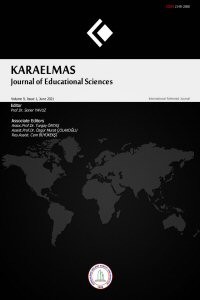Lingua Franca Olarak İngilizce Öğretimi
Bugün İngilizce dünyada yaygın olarak kullanılmakta ve öğretimi konusunda bazı değişiklikler olmaktadır. 30 yılı aşkın süredir İngiliz Dil öğretimi büyük oranda artmış olup, günümüzde de ana dili İngilizce olmayan uluslar tarafından giderek daha da yaygın olarak kullanılmaktadır. Buradan çıkarılacak sonuç günümüzde ingilizcenin lingua-franca haline gelmiş olmasıdır. Bununla bağlantılı olarak dünyadaki değişen taleplere cevap vermek için İngilizce öğretimi güncellenmelidir. Geçmişten günümüze çok sayıda metotlar, yaklaşımlar ve teknikler ortaya çıkmış ve birbiri ardı sıra kullanılmıştır. Yeni akımlara göre İngilizce öğretimi, öğrenmeyi ve dili kullanmayı eş zamanlı olarak ayarlayarak ve sınıftaki öğrenci katılımıyla birlikte oluşturmak ve organize etmektir, yani çıktı temelli değil de, işlev temelli öğretim gözde olmuştur. Bu çalışmanın amacı İngilizcenin lingua franca olarak kullanılması ile ilgili olarak öğretiminin değerlendirmesini yapmaktır
Anahtar Kelimeler:
İngilizce, Lingua Franca, Akım, Öğretim, Öğrenme
English Language Teaching as Lingua Franca
Today, English is used and taught as a common language all over the world; however, there have been changes in the way it is taught. Over the past thirty years, English Language teaching has expanded to the extent that those whose native language is not English currently use English even more widely. It can be inferred from its status that it is the lingua franca of the world. In order to prepare learners for the changing demands across the globe, the teaching of English should be updated. Up until now, many approaches, techniques and methods have been created and used one after another. According to the latest trends, English Language teaching should create or organize conditions that promote learning. By using the language simultaneously through the student participation in classroom activities, a process rather than a product-oriented view of teaching has become popular. This study will review English Language teaching resulting from the usage of English as a lingua franca
Keywords:
English, Lingua Franca, Trend, Teaching, Learning,
___
- Cogo, A. (2012). English as a lingua franca: concepts, use, and implications. ELT Journal, 66, 97-105.
- Crystal, D. (2003). English as a global language (2nd ed.). Cambridge University Press: Cambridge.
- Giddens, A. (1990). The consequences of modernity. Polity Press: Cambridge.
- Graddol, D. (1997). The future of english. The British Council: London. Graddol, D. (2006). English Next. British Council, UK, retrieved from, http:// www.britishcouncil.org/files/documents/learning-research-english-next.pdf>
- Groom, C. (2012). Non-native attitudes towards teaching english as a lingua franca in europe. English Today, 28, 50- doi:10.1017/S026607841100068X
- Gross, S. (2016). The development of English as an Asian lingua franca and its impact on English teaching in Vietnam.
- English as an International Language Journal, 11(1), 1-18. Jenkins, J. (2014). English as a lingua franca in the international university. Routledge: New York.
- Jenkins, J. (2015). Global englishes (3rd ed.). Routledge: London.
- Kirkpatrick, A. (2010). English as an Asian lingua franca and the multilingual model of ELT. Language Teaching, 44, 224.
- Kumaravadivelu, B. (2008). Cultural globalization and language education. CT, Yale University Press: New Haven.
- Llurda, E. (Ed.). (2005). Non-native language teachers: perceptions, challenges and contributions to the profession.
- Springer: New York, NY. Richards, J. C. (2000). Curriculum development in language teaching. Cambridge University Press: New York.
- Seidlhofer, B. (2005). English as a Lingua Franca. ELT Journal, 59(4), 339-341.
- Sercu, L., Bandura, E., Castro, P., Davcheva, L., Laskaridou, C., Lundgren, U. & Ryan, P. (2005). Foreign language teachers and intercultural competence: An international investigation (Vol. 10). Clevedon: Multilingual Matters.
- ISSN: 2148-2888
- Yayın Aralığı: Yılda 2 Sayı
- Başlangıç: 2013
- Yayıncı: Zonguldak Bülent Ecevit Üniversitesi
Sayıdaki Diğer Makaleler
Popüler Kültürün Gençlerdeki Değer Algısına Etkisi ile İlgili Bir Durum Tespiti
Öğretmenlerin Üstün Yetenekli Öğrencilerin Özellikleri ve Eğitimlerine Yönelik Algıları
Çiğdem AKKANAT, Neşe KUTLU ABU, Murat GÖKDERE
İngiliz Dili ve Edebiyatı Bölümündeki Dilbilime Giriş Dersinin Yeterliği Üzerine Bir Değerlendirme
Öğretmen Adaylarının ve Öğretmenlerin Çocuk Edebiyatına İlişkin Görüşleri
Biyoloji Öğretmen Adaylarının Dijital Deney Araçlarına Yönelik Görüşleri
Ahmet GÖKMEN, Tuğba TAFLI, Tahir ATICI
